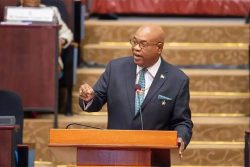Dear Editor,
With almost every passing day there is a story in the mainstream media about the impending oil and gas bonanza that is likely to boost Guyana’s fortunes in the not too distant future.
According to Bob McNally, President of the Rapidian Energy Group; “Guyana is the most recent but rare incident of a brand new petroleum-state out of nothing.”
What is most unfortunate about the stories published in the local media is that they are fundamentally academic and highly technical. There are others that are so esoteric and highfalutin in language that they make no sense whatsoever to ordinary citizens.
What the public wants it’s not getting. What’s in it for me? Will I benefit? If so, in what way? Surely, they can’t be blamed for thinking in that way.
The stories about oil and gas that Guyanese are reading are sterile and dull, they soar above the heads of the man on the street. Some have no relevance to Guyana.
From all appearances, the on-going discourse on the subject has been hijacked by those who claim to be experts or wannabe experts in the sector.
Neither Exxon’s PR Department nor the Government of Guyana’s DPI consider it necessary to engage Guyanese on such matters. As the saying goes; ‘We are too big to bother ourselves with small potatoes.’
So much for the good corporate citizen and the caring government.
A popular view on the street is that the so-called Guyanese experts in oil and gas should learn from Anil Nandlall’s skill in articulating complex issues pertaining to constitutional and criminal law. Nandlall they claim, articulates his views in a manner that makes complex legal issues easily understood by John and Jane public.
If there was one political leader in Guyana in Guyanese history who was good at communicating his ideas in a way common people could understand, it was Cheddi Jagan. He had the ability to do so in plain and simple language just as his cabinet ministers did in the 1957 to 1964 PPP government.
Of course in those days, the natural way of communicating with the common man and woman was through visits to the sugar estates, the rice fields, the water front, the saw mills and all other places where workers and farmers could be found.
But leaders who were gifted in communicating their thoughts to the people like Jagan, Burnham and Rodney are long gone, and today’s communicators are hooked on Facebook, WhatsApp, YouTube, messenger, email, tv, radio or newspaper.
That aside, what is noteworthy is that there remain thousands in Guyana who do not have an IPhone, a TV, a radio nor access to daily newspapers.
They are effectively out of the information communication loop save by word of mouth.
In the circumstances, it does not require rocket science to recognize the dearth of knowledge impacting the thousands who have been, and will continue to be left behind lacking the basic knowledge concerning the oil and gas industry.
Consequently, the major challenge is in the social and political arena, that being, how to capture, translate and bring to an acceptable level of understanding for the common man and woman, the pluses and minuses of an oil economy in a Guyanese context.
One is left to wonder whether the current discourse is being kept at a level calculated to keep the populace in the dark with respect to the shady goings-on and perceived concubinage in the sector which thus far, appears to be the business of a few.
It is for this and other reasons that the great majority of Guyanese are skeptical, if not indifferent about the hullabaloo that they stand to benefit from the bonanza that would flow from the oil and gas economy.
At this stage of the discussion, as far the citizenry is concerned, it’s not just about which party’s oil and gas policies will win but whether the poor and dispossessed will benefit from oil and gas the bonanza.
Benefits of oil and gas need to be stamped on an agenda for national debate at a People’s Fora.
The fora should not be a one-off event, nor should it be held at the exclusive Marriott or the Pegasus, but in towns, villages and communities across the country.
Yours faithfully,
Clement J. Rohee








